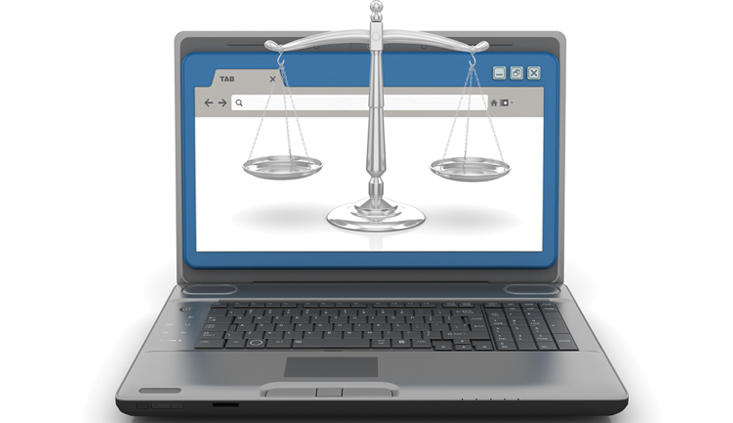Web profiles and ethical concerns
You may love, hate or be indifferent about what’s posted about you on a website, but what are your ethical obligations?
Google your name and you may find that you are listed on various websites rating attorneys and providing information to potential clients about your background and a space for clients to review you – Yelp, Avvo, and SuperLawyers, to name a few. You may not have even been aware that you had a profile on these websites, or you may have created the profile yourself. You may have reviews that include inaccurate information or that you want to respond to. What are your ethical obligations with respect to these websites?
The factual accuracy of your profile page
Rule of Professional Conduct 7.1(a) states, “A lawyer shall not make a false or misleading communication about the lawyer or the lawyer’s services. A communication is false or misleading if it contains a material misrepresentation of fact or law, or omits a fact necessary to make the communication considered as a whole not materially misleading.” Comment [1] to Rule 7.1 states, “A communication includes any message or offer made by or on behalf of a lawyer concerning the availability for professional employment of a lawyer or a lawyer’s law firm directed to any person.”
The State Bar of California’s Standing Committee on Professional Responsibility and Conduct issued Formal Opinion No. 2019-199, analyzing an attorney’s ethical obligations regarding a profile posted on a professional directory website maintained by a third party.
The Committee found that the profile page on a professional directory website becomes a “communication” made “by or on behalf of a lawyer” governed by Rule of Professional Conduct 7.1(a) when “the attorney exercises control over it by adopting it as directed by the site itself in order to market the attorney’s practice [. . . or] if the attorney used the profile to market the attorney’s practice even without ‘adopting’ the profile as directed by the site itself.” (Formal Opinion No. 2019-199, at 4.) Thus, if you “adopt” the profile or use it for your own marketing (e.g., by providing a link to the profile from your own website), the profile then becomes communication on your behalf governed by Rule of Professional Conduct 7.1(a).
If you have created an account on one of these websites and claimed the profile page as the owner of the firm, if you filled out or maintain the profile, if you link to it from your website, if you refer clients or prospective clients there, or if you respond to reviews that clients write there, you have probably “adopted” the page.
[Editor’s note: If you have written an article for Advocate, the profile you provided is likely on the website with that article. Is it up to date? www.advocatemagazine.com. Email us with changes.]
Once you have adopted the profile or otherwise used the profile to market yourself, you have obligated yourself to complying with the Rules of Professional Conduct with respect to the information on the page not only to ensure what you have posted on the page is truthful and not misleading, but also “to take reasonable steps to ensure that the factual content on the profile page posted by others is similarly truthful and not misleading.” (Formal Opinion No. 2019-199, at 4.)
If you have not adopted the profile or taken any action to benefit from the profile, then you are not responsible for its content, but still must “correct any misconceptions of a prospective client who approaches the attorney after consulting the website profile.” (Formal Opinion No. 2019-199, at 4.)
The obligation to comply with ethical rules with respect to a profile on a professional directory website maintained by a third party ends if the attorney “abandons” the profile. The Committee noted that whether an attorney has “abandoned” the page is a “case-by-case, fact-based inquiry,” but could include posting a disclaimer that the attorney is no longer monitoring the page, as well as no longer referring clients to the page and no longer including a link on the attorney’s website to the page. (Formal Opinion No. 2019-199, at 10.)
Third-party reviews
The obligation to ensure that all information posted on an online profile is accurate and not misleading extends even to reviews posted by third parties on professional directory websites, provided the attorney has “adopted” the profile or uses the profile to market himself or herself.
What obligations do you have if a client posts a factually inaccurate or misleading review? If you have adopted the profile or used it in your marketing, you are obligated to take reasonable steps to correct the inaccuracies, which could include requesting that the client amend the review or requesting that the website administrator either correct the review, add a disclaimer, or delete the review. If none of those options are successful, the attorney still has the obligation to post something to address the inaccuracies: “Attorney must post something on the site in order to satisfy Attorney’s ethical obligation under rule 7.1. Such posting must include an appropriate disclaimer or qualifying language as to the inaccurate information, or a statement that the editorial policies of the site are such that the attorney cannot vouch for the factual accuracy of third-party content, either generally or as regards a particular post.” (Formal Opinion No. 2019-199, at 8.)
Even if a review is factually accurate, it may be misleading to prospective clients. Comment [4] to Rule of Professional Conduct 7.1 warns about testimonials from clients having the potential to be misleading: “A communication that truthfully reports a lawyer’s achievements on behalf of clients or former clients, or a testimonial about or endorsement of the lawyer, may be misleading if presented so as to lead a reasonable* person* to form an unjustified expectation that the same results could be obtained for other clients in similar matters without reference to the specific factual and legal circumstances of each client’s case.” Thus, a review that states what results a client obtained could be misleading to potential clients who may be led to believe they will obtain a similar result. The best practice may be to include a disclaimer on the page that results in one case do not guarantee results in another case.
Ethical considerations in responding to negative reviews
Regardless of whether or not you have “adopted” a profile, you may have received a negative review from a client or former client. Though it may be tempting to respond, be aware of your ethical obligations when deciding whether to respond or what you can say in response.
Attorneys have an ongoing duty of confidentiality and loyalty to both current and former clients. (Bus. & Prof. Code, § 6068, subd. (e); Rule of Professional Conduct 1.6; see also General Dynamix Corp. v. Superior Court of San Bernardino County (1994) 7 Cal.4th 1164, 1190 [“Except in those rare instances when disclosure is explicitly permitted or mandated by an ethics code provision or statute, it is never the business of the lawyer to disclose publicly the secrets of the client”].) Attorneys are prohibited from acting in ways that would injure clients or former clients in any matter in which the attorney represented them. (Wutchumna Water Company v. W.R. Bailey (1932) 216 Cal. 564.)
The duty of confidentiality continues to apply even if the client discloses facts about the representation. (Los Angeles County Bar Association Professional Responsibility and Ethics Committee Opinion No. 525 (2012) [“absent a statutory exception allowing Attorney to reveal confidential communications in response to Former Client’s public statement, Attorney remains obligated to preserve Former Client’s confidential information, and Attorney cannot disclose such information in response to that public statement unless authorized to do so by a court’s ruling in a judicial proceeding”].)
These obligations may prevent you from refuting any specific allegations that the client made in the review, but you still may be able to respond within those bounds.
The Los Angeles County Bar Association Professional Responsibility and Ethics Committee issued an opinion finding that an attorney may respond to a negative review from a former client if (1) the response does not disclose any confidential information; (2) the response will not injury the former client in any manner involving the former representation; and (3) the response is proportionate and restrained. (Los Angeles County Bar Association Professional Responsibility and Ethics Committee Opinion No. 525 (2012).)
The safest response, if you decide one is necessary, may just be to assert your general disagreement with the review, without addressing any specifics, and to state that confidentiality rules prevent you from responding further.
Conclusion
If you have any interaction with your profile on a third-party website – claimed the profile page as the owner of the firm, if you filled out or maintain the profile, if you link to it from your website, if you refer clients or prospective clients there, or if you respond to reviews that clients write there – you would probably be deemed to have “adopted” the page and should make sure to comply with all ethical obligations with respect to that page, including ensuring that nothing on the profile or in the reviews is inaccurate or misleading. In addition, be careful not to disclose any confidential information when responding to reviews.
Allison Schulman

Allison Schulman is the founder of the Law Offices of Allison M. Schulman, APC in Los Angeles. Her practice areas include employment litigation, discrimination, harassment, retaliation, wrongful termination, sexual assault, civil rights, wage-and-hour, and personal injury.
Copyright ©
2025
by the author.
For reprint permission, contact the publisher: Advocate Magazine

